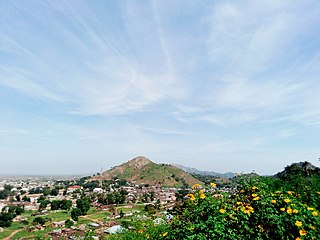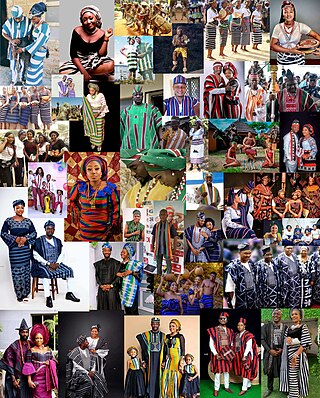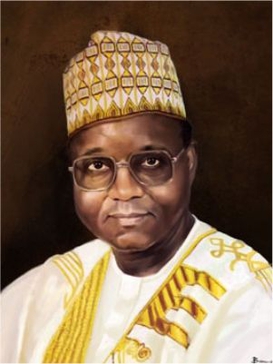Related Research Articles

Plateau State is the twelfth largest Nigerian state. It is located near the centre of Nigeria and includes a range of hills surrounding the Jos Plateau, its capital, and the entire plateau itself. Plateau State is described as "The Home of Peace and Tourism". With natural formations of rocks, hills and waterfalls, it derives its name from the Jos Plateau and has a population of around 4.7 million people.

Kaduna State is a state in the northwest geopolitical zone of Nigeria. The state capital is its namesake, the city of Kaduna, which was the 8th largest city in the country as of 2006. Created in 1967 as North-Central State, which also encompassed the modern Katsina State, Kaduna State achieved its current borders in 1987. Kaduna State is the fourth largest and third most populous state in the country, Kaduna State is nicknamed the Centre of Learning, owing to the presence of numerous educational institutions of importance within the state such as Ahmadu Bello University.

The Middle Belt or Central Nigeria is a term used in human geography to designate a belt region stretching across central Nigeria longitudinally and forming a transition zone between Northern and Southern Nigeria. It is composed of the southern half of the defunct Northern Region of Nigeria, now comprising mostly the North Central and parts of the North East and North West geopolitical zones, and is characterised by its lack of a clear majority ethnic group. It is also the location of Nigeria's Federal Capital Territory.
Sanga is a Local Government Area in southern Kaduna State, Nigeria. Its headquarters is in the town of Gbantu. The Local Government Council is chaired by Bisallah Malam. It has an area of 1,821 km2 and had a population of 151,485 as at the 2006 census. The postal code of the area is 801.

The 2010 Jos riots were clashes between Muslim and Christian ethnic groups in central Nigeria in and near the city of Jos. The first spate of violence of 2010 started on 17 January in Jos and spread to surrounding communities. Houses, churches, mosques and vehicles were set ablaze, during at least four days of fighting. At least 326 people, and possibly more than a thousand, were killed.

Alhaji Mohammed Dabo Lere was a Nigerian politician who served as the governor of Kaduna State from January 1992 to November 1993 during the Nigerian Third Republic, leaving office after the military coup that brought General Sani Abacha to power.

Communal conflicts in Nigeria can be divided into two broad categories:
Herder–farmer conflicts in Nigeria are a series of disputes over arable land resources across Nigeria between the mostly-Muslim Fulani herders and the mostly-Christian non-Fulani farmers. The conflicts have been especially prominent in the Middle Belt since the return of democracy in 1999. More recently, they have deteriorated into attacks on farmers by Fulani herdsmen.
Adara people, are an ethnic group in the Middle Belt who speak the Adara language, a north Plateau language of Nigeria. Dio Awemi Maisamari is the National president of Adara Development Association (ADA) with his assistant Luke Waziri assistant secretary of the association.

Southern Kaduna is an area of the Nok Culture region inhabited by various related ethnic groups who do not identify as Hausa, living south of Zaria, Kaduna State. It is located in the Middle Belt region of Nigeria. Southern Kaduna consists of 12 Local Government Areas out of a total of 23 in Kaduna State.
Toure Kazah-Toure was a Nigerian academic, activist, and pan-Africanist. His admiration for founding Guinean president, Ahmed Sékou Touré, led to his adoption of the name "Toure". He was a history lecturer and researcher at Ahmadu Bello University (ABU), Zaria, Nigeria, with a number of publications in his name.
The 2023 Kaduna State gubernatorial election will take place on 18 March 2023, to elect the Governor of Kaduna State, concurrent with elections to the Kaduna State House of Assembly as well as twenty-seven other gubernatorial elections and elections to all other state houses of assembly. The election—which was postponed from its original 11 March date—will be held three weeks after the presidential election and National Assembly elections. Incumbent APC Governor Nasir Ahmad el-Rufai is term-limited and cannot seek re-election to a third term.

The bandit conflict in northwest Nigeria is an ongoing conflict between the country's federal government and various gangs and ethnic militias. Starting in 2011, the insecurity remaining from the conflict between the Fulani and Hausa ethnic groups quickly allowed other criminal and jihadist elements to form in the region.
Events in the year 2022 in Nigeria.
On 28 March 2022, an Abuja–Kaduna train was attacked in Katari, Kaduna State, Nigeria. In response, the Nigeria Railway Corporation (NRC) briefly halted operations along the route.

On 10 April 2022, a gang of bandits killed more than 150 people in a series of attacks in Plateau State, Nigeria. The attacks are linked to the ongoing Nigerian bandit conflict. About 70 people were also kidnapped in the attacks.
Between December 19 and 25, 2022, several villages in Kagoro, Kaduna State, Nigeria were attacked by unknown groups, who killed over 46 people in two attacks.
The immediate origins of the genocidal killings in Southern Kaduna especially in the 2010s and early 2020s can be traced to the events that brought in Goodluck Jonathan into power in 2010 as the President of Nigeria, and escalated after the presidential election in 2011, which he won.
Southern Kaduna People's Union (SOKAPU) is a socio-cultural organization, acting as an umbrella body representing the people of Southern Kaduna, Kaduna State, Nigeria. In a statement made by the chairman, Southern Kaduna Leadership Council (SKLC), Ishaya Dary Akau, in September 2022, SOKAPU was mentioned as a member of the council. However, many are uncomfortable with the SOKAPU being berated as a member of the SKLC. As of March 2024, the SOKAPU National President was Samuel Tabara Kato.
References
- ↑ "Defence Chief visits troops fighting bandits in North-West Nigeria". AIT LIVE. Retrieved 2020-12-16.
- ↑ Amaza, Mark. "Nigeria is also losing control of its troubled northwest region". Quartz Africa. Retrieved 2020-12-16.
- ↑ "Nigeria: Security forces kill 17 bandits in Kaduna state May 12". GardaWorld. Retrieved 2020-12-16.
- ↑ "Nigeria's Cultural Efflorescence". Council on Foreign Relations. Retrieved 2020-12-16.
- ↑ Olarewaju Kola (2020-10-11). "Nigeria: 12 killed in bandit attacks on northern towns".
- ↑ "Nigerian Govt. Says 204 Killed In Southern Kaduna Crisis - Premium Times". Sahara Reporters. 2017-01-13. Retrieved 2020-12-16.